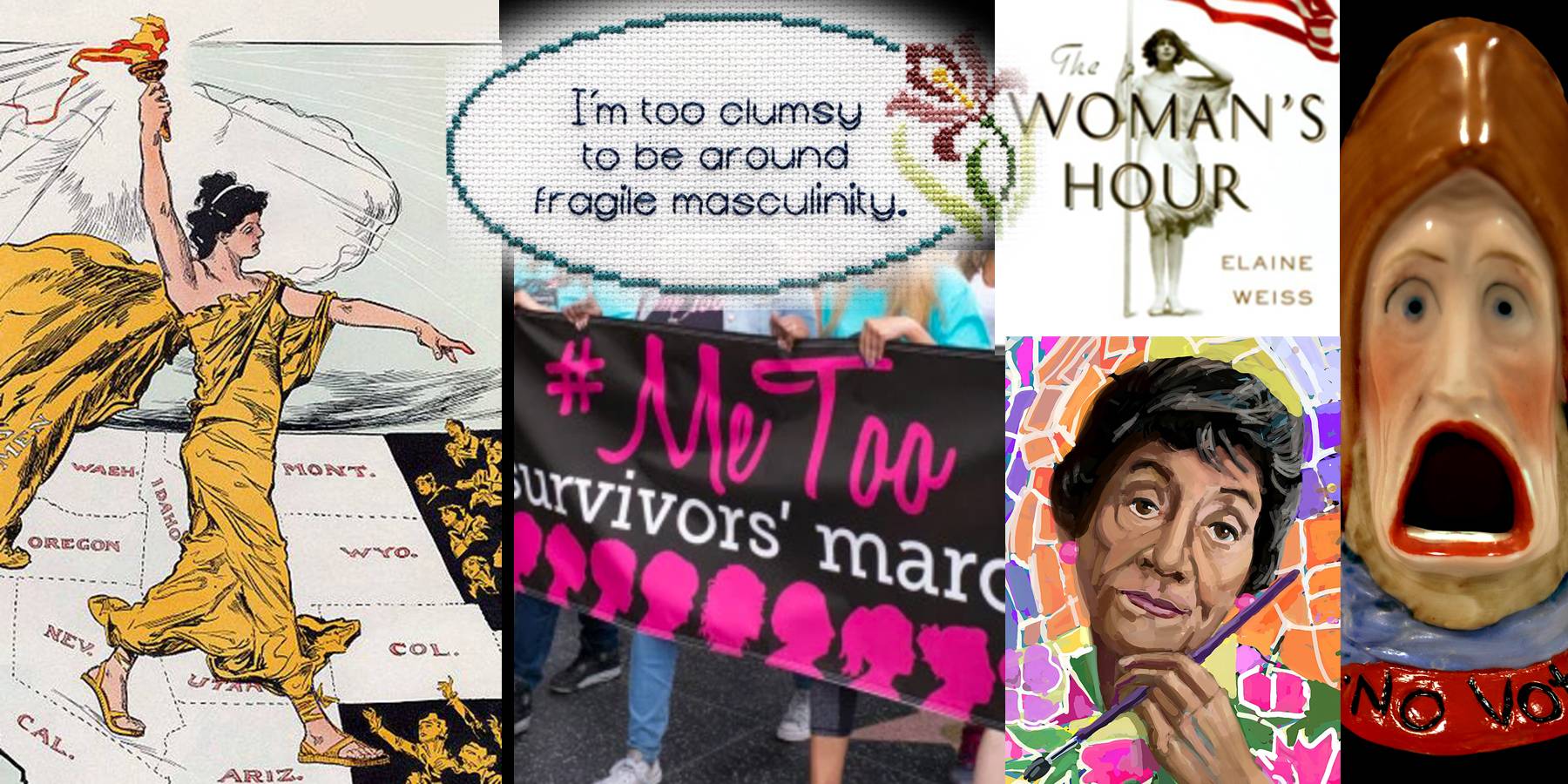Is this winter dragging? How long, really, until it’s spring for real?
Take a deep breath and join the blast of energy that will span all of March for Women’s History Month. The ante is up this year, preparing for what may be the most important day of the month, the Illinois General Primary on March 17th. Take note of the women on the ballot for contested races: U.S. House, Circuit Judge, Circuit Clerk, County Board and precinct committee chairpersons. And, women are taking a central place in the Democratic Primary for President of the United States. It’s all too obvious that some of the rights we have taken for granted are once again under attack. #MeToo is having some victories, but the struggle goes on. March is the perfect time to stand together.
All month the spotlight is on the 100th anniversary of women’s right to vote. The 19th Amendment was ratified in 1920: “The right of citizens of the United States to vote shall not be denied or abridged by the United States or by any state on account of sex.”
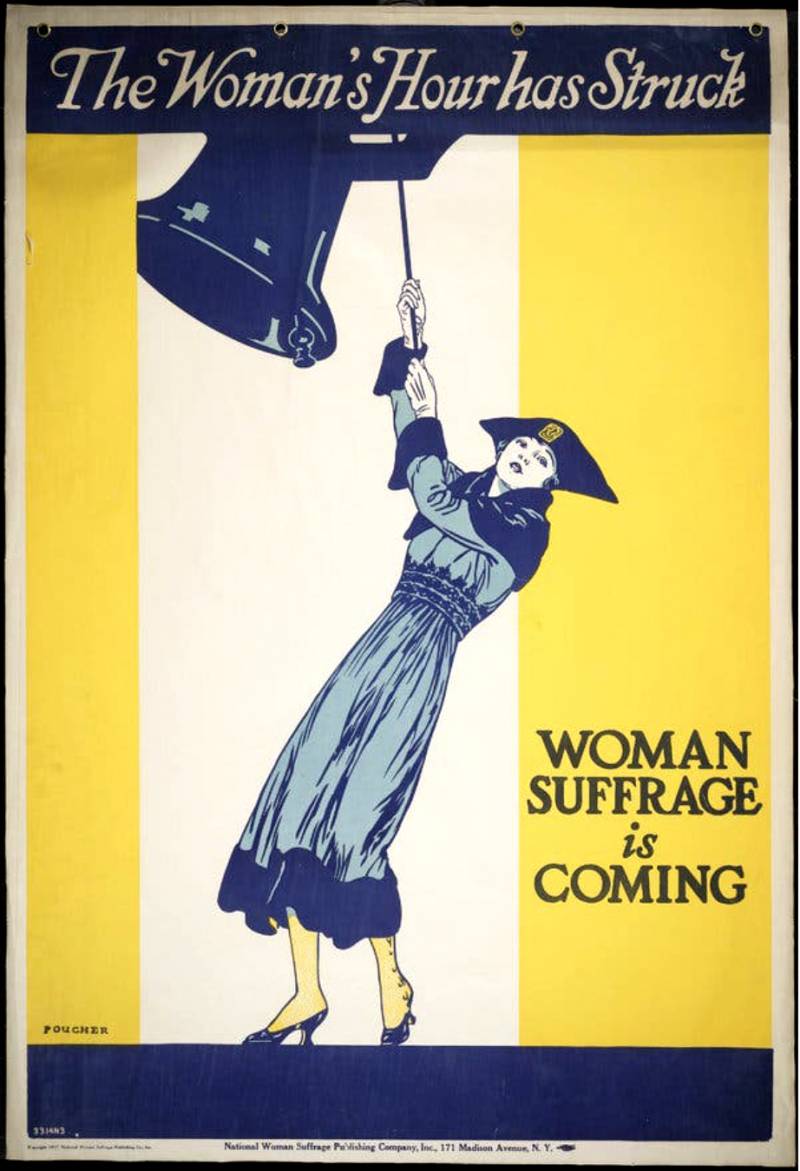
Image from New York State Library.
The issues behind events of 1920 are as real and urgent today as they were then: dark money, race and racism, religion, political influence and corporate corruption, and the libelous ways activist women were portrayed by the press. The fights between the Suffragists, known as Suffs, and the Antis were heated between many factions. The liquor industry believed that the Suffs would force temperance that would shut down their business. Antis were persuasive in the South, comparing suffragist interests with those of the Civil War, and that opening the vote to women would open a wave of influence of African Americans. Indeed, even when women were allowed the vote, discriminatory practices around registration requirements greatly limited the numbers of women of color who actually could vote.
Teresa Barnes, who holds a joint appointment in History and Gender and Women’s Studies at the University of Illinois and directs the Center for African Studies, will lead the conversation. Get there by 6:15 and you can cheer our womyn mayors of Champaign and Urbana, Deborah Frank Feinen and Diane Marlin, as they reaffirm the proclamation that named February 14th the League of Women Voters Day. Our local league, the LWV of Champaign County, was formed in 1922 — it was there on the front lines during the early suffrage. Local history displays from The Museum of the Grand Prairie and the Champaign County Historical Archives will be on view. Rumor is that there will be a 100th anniversary cake. Don’t miss it!
The Woman’s Hour: The Great Fight to Win the Vote
Urbana Free Library, Lewis Auditorium
Urbana
March 3rd, 6:15 p.m., Mayors’ Proclamation; 7-8 p.m., book discussion
History exhibits and refreshments following.
* * *
Now that you’re warmed up on on the politics, put Saturday, March 7th on your calendar to head out to the Museum of the Grand Prairie for the opening of their exhibit, How Long Must Women Wait? Woman Suffrage and Women’s Rights in Champaign County. They have brought material from their own collections, along with pieces on loan from the Illinois History and Lincoln Collection and Spurlock Museum. For a teaser, here’s an amusing relic of “The Hatpin Peril” that supposedly terrorized men who might make unwanted advances on women, newly claiming their right to be out alone on the streets. And, horrors, to fight for their right to vote. In those days of long hair and hats, women’s hatpins could be a foot long — a handy weapon if needed.
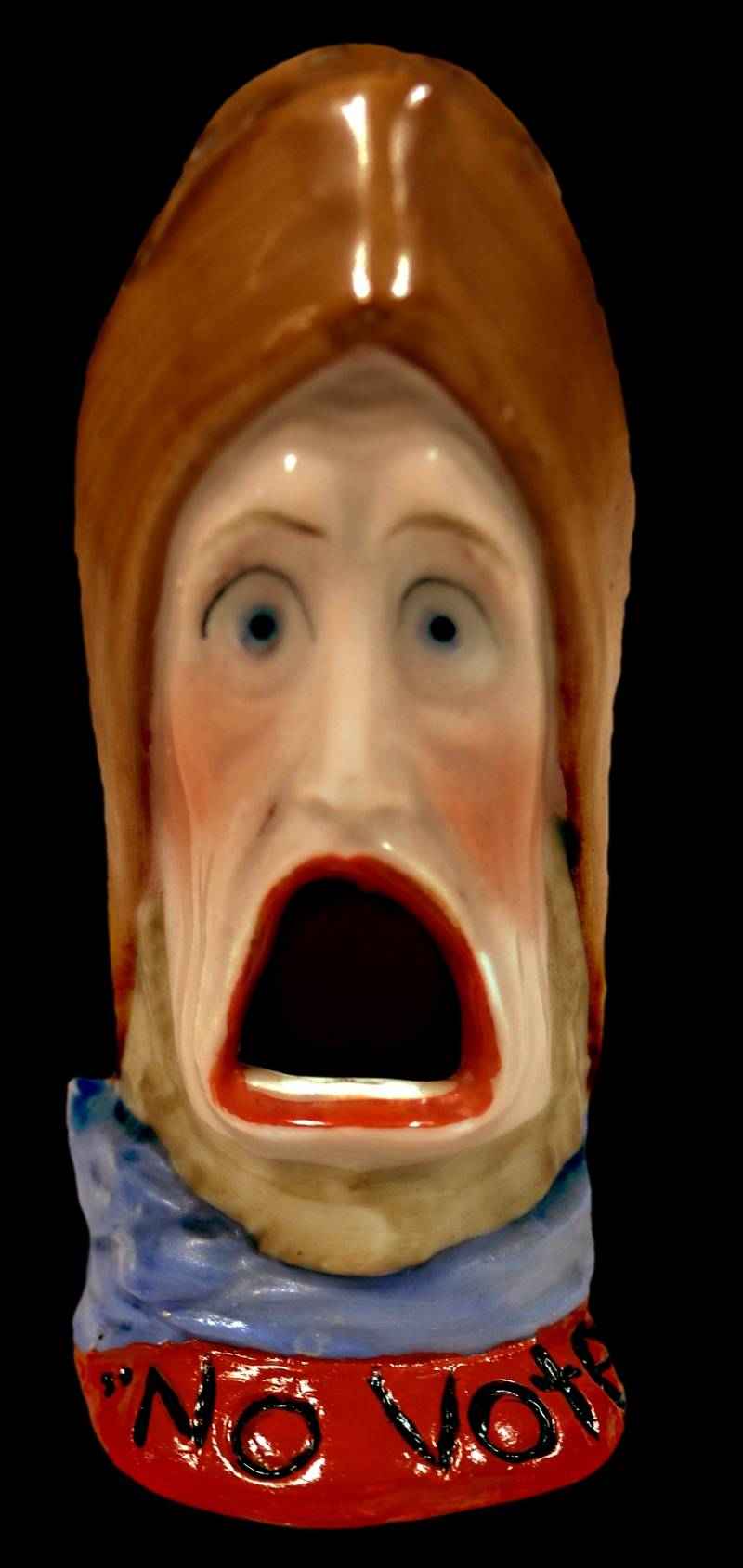
Photo from Spurlock Museum.
Other highlights of the exhibit are a mural created with students from Franklin Middle School’s STEAM Academy, with the Sisterhood Academy of Excellence, an afterschool program tailored to girls of color. And at 2 p.m, a special treat will be performances by three students from Eastern Illinois University who have sewn their own costumes and prepared to enact the personae of three activists: suffragist Angelina Grimke; Jeannette Rankin, first woman elected to the U.S. House of Representatives; and — get this oh residents of the landlocked Grand Prairie — 17th century Irish Pirate Queen Grace O’Malley. How can you resist that?
How Long Must Women Wait?
Museum of the Grand Prairie
Mahomet
March 7th, 1:30 to 4 p.m.
Let’s take a moment to go back to the essential roots of Women’s History Month. We have the Socialist Party of America to thank for the first Women’s Day in 1909, held in New York. The year after, German revolutionary Clara Zetkin proposed at the International Socialist Woman’s Conference that March 8th be an annual International Women’s Day. To restore some vital women to the history books, come to the third annual campus celebration on March 9th for the surprise unveiling of Twelve Women Who Changed the World: Untold Stories. Co-hosted by the Illinois Program for Research in the Humanities and the Women & Gender in Global Perspectives Program, the panel brings together an unexpected range of interests and disciplines, from the Chancellor to NCSA, Theatre, Social Work, English, Law and Anthropology and more. Each is given five minutes to profile a woman who has made difference in academia. Be ready to cheer as women are given proper credit for their seminal academic work, and join in for refreshments afterward. The event is free and open to the public.
And put March 26th on your calendar for the 40th anniversary of WGGP.
Twelve Women Who Changed the World: Untold Stories
Levis Faculty Center Room 300
Urbana
March 9th, 3:30 to 5 p.m.
40th Anniversary Celebration of Women & Gender in Global Perspectives Program
Latzer Hall, University YMCA
Champaign
March 26th, 9 a.m. to 5:30 p.m.
* * *
And now on to theatre. Parkland College and the Urbana Arts and Culture Program have sponsored a production of the play Machinal, 90 Years of the Machine, which brings a highly noted style and drama to ongoing challenges in many women’s experiences. Director June Clark Eubanks calls it “a journey through the life of Everywoman over the last nine decades. Our production offers an allegorical look at what it means to be ‘free’ and female here in our mechanized, capitalist, and patriarchal society.”
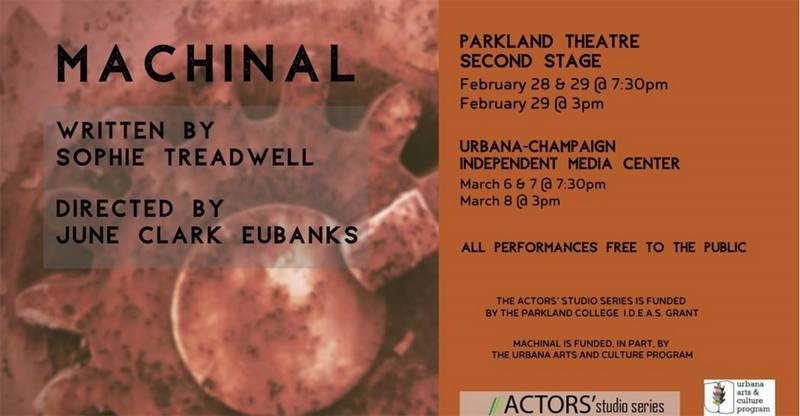
The story is based on the life of Ruth Snyder, accused and tried for the murder of her husband and executed in the electric chair at Sing Sing Prison. Journalist and playwright Sophie Treadwell translated the lurid tragedy into an allegorical treatment of the stages of women’s lives, in a distinctive production that was hailed as a high point of Expressionist theatre.
Eubanks has cast nine women to each act one of the archetypal segments of the young woman’s life — through mind-numbing work, loveless marriage, post-partum depression, betrayal, despair, murder, trial and death. Acted and staged by Parkland students, a notable aspect of the production is the soundscape by Logan Dirr, carefully layered to convey the noise of the relentless industrial society which drove the heroine to despair: The sounds of steel and riveting on the street, the typing pool, neighbors arguing.
All performances are free. It’s first come, first seated.
Machinal, 90 Years of The Machine
Independent Media Center
March 6th and 7th, 7:30 pm
March 8th, 3 p.m.
* * *
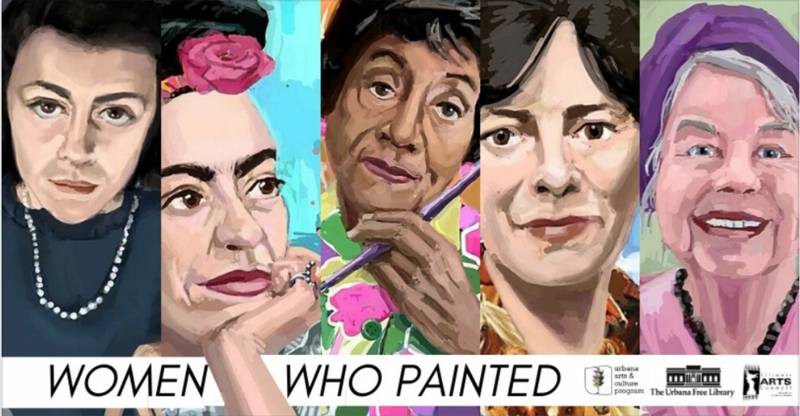
Photo from Urbana Arts and Culture Program Facebook page.
Make it a point to take in the City of Urbana’s Artist of the Corridor for Women’s History Month, on display at Urbana City Hall and the Urbana Free Library. Even better, plan on attending the opening at the Urbana City Building on March 5th. You’ll see a stunning range of portraits of Women Who Painted, a project of Champaign artist Paula McCarty. In 2016 she was inspired to make a portrait of one woman painter a month, organized around their birth month. You’ll enjoy wandering the show and reading about these women, each a pathbreaker in her own way. McCarty was astounded to learn that in the standard college text, Jansen’s Basic History of Western Art, of 318 artists in the 9th edition, only 27 are women. Once again it’s only too obvious that it’s time for women to be restored to their rightful equality in history.
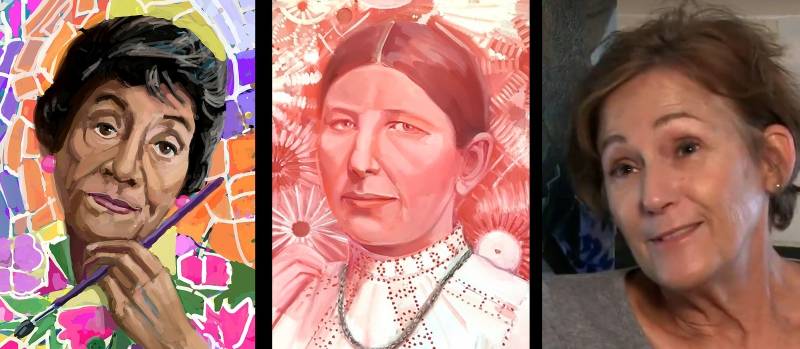
Portraits courtesy of Paula McCarty; photo from UPTV video by Jason Liggett.
McCarty has completed 20 digital images and 10 oil paintings. Here you can see the artist and two of her paintings of women whose stories she found compelling. Alma Thomas, had many firsts as an African American woman: first to graduate from Howard University in Fine Arts, first to have a solo show at the Whitney Museum in New York, at 81, and first to have her art in the White House permanent collection. Anna Ancher was a Danish painter, highly regarded as a member of the Skagen Arts Colony. Her work, focusing on color and light, was featured on Danish currency.
McCarty will be offering several workshops in March, including one on March 7th at Art Coop for teens, and one on March 30th at the Urbana Free Library for mixed ages.
Women Who Painted opening
Urbana City Building
Urbana
March 5th, 5:30 to 7 p.m.
Portrait Workshop with Paula McCarty
Urbana Free Library, Lewis Auditorium
Urbana
March 30th, 6 to 8 p.m.
* * *
And by all means, try your own hand at Feminist Cross Stitch for Women’s History. Join Lisa Connery of Crass Stitching for a two-session program at the Urbana Free Library on March 4th and 11th. Beginners and experienced stitchers welcome; register here if you need supplies.
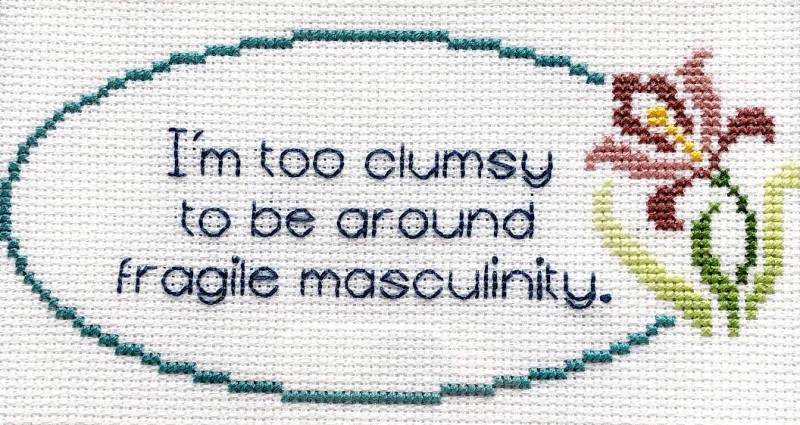
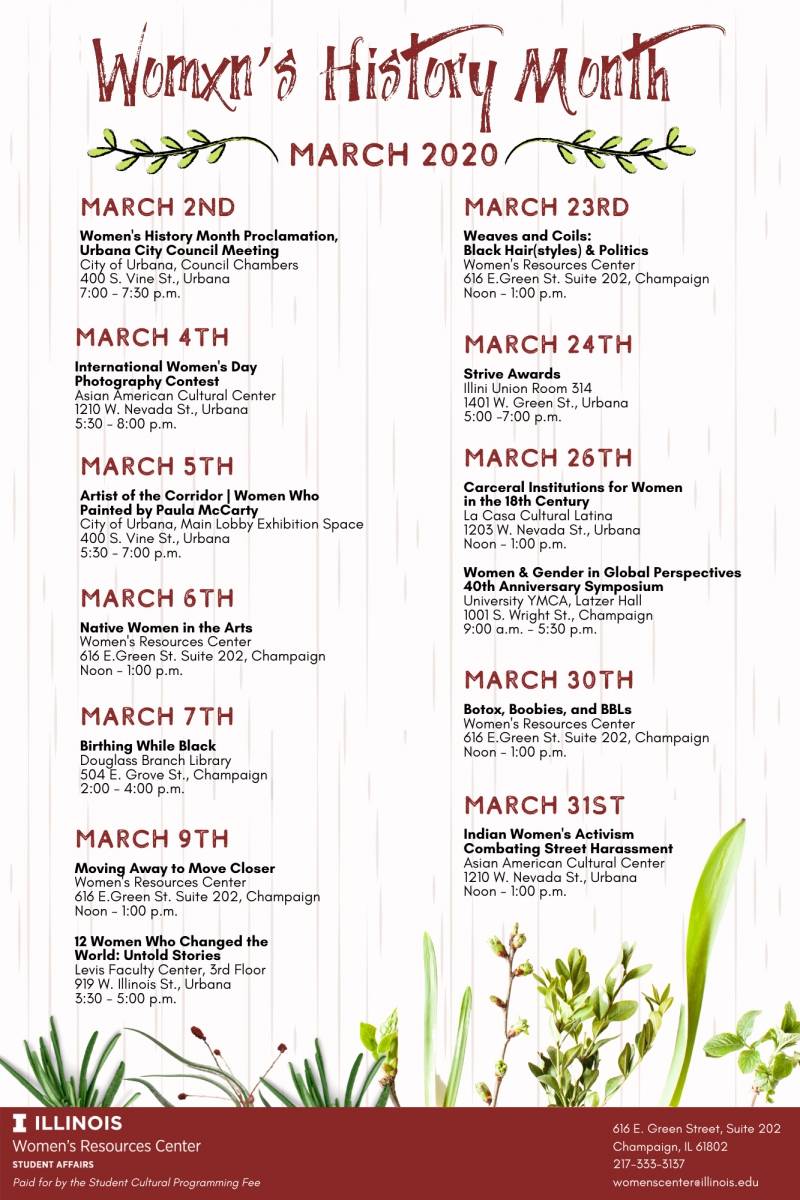
Image from Women’s Resource Center.
As we all feel helpless in the chaos of the political and global scene, it can be good to focus on what we can do. With challenges to the Equal Rights Amendment, Roe v. Wade, sanctuary for refugees in our country, and other rights that have been considered fundamental but are now in question, take a moment to gather, to honor, to celebrate, and to learn something about the hard won history for equal rights for all.
Keep your eyes open too for ongoing events focused on women’s issues.
The League of Women Voters of Champaign County has a monthly calendar, and always offers comprehensive candidate forums before elections. Its roots lie in the Twin City Equal Suffrage Association, described in the exhibit at the Museum of the Grand Prairie.
The American Association of University Women (AAUW), Champaign/Urbana branch, is a national voice that has promoted equity and education for women and girls since 1881. Its members have examined and taken positions on the fundamental issues of the day: educational, social, economic, and political. We are lucky to have an active local group with a regular calendar. Current president Gail Tittle points out their Adelante monthly book group that discusses various books related to diversity. They hold a monthly Drinks & Dialogue at a local restaurant to discuss issue important to women, host a speaker event annually related to Equal Pay Day, and sponsor scholarships at Parkland College for women who want to resume their interrupted education.
The YWCA of the University of Illinois, with its mission “eliminating racism, empowering women” has long been a strong local voice for women’s issues. Their Women in Leadership (WIL) program pairs young women at the University of Illinois and Parkland in teams with a business or nonprofit, and take on a challenge to work through real life issues facing community needs. Visit their website and catch up on their impressive programming, including issues of Girls of Color and Trauma, the Women’s Career Institute, and how to be an activist without burning out. Come hear an overview of their programs and get acquainted at their annual dinner on Sunday, April 19th.
Top image created by Cope Cumpston.








